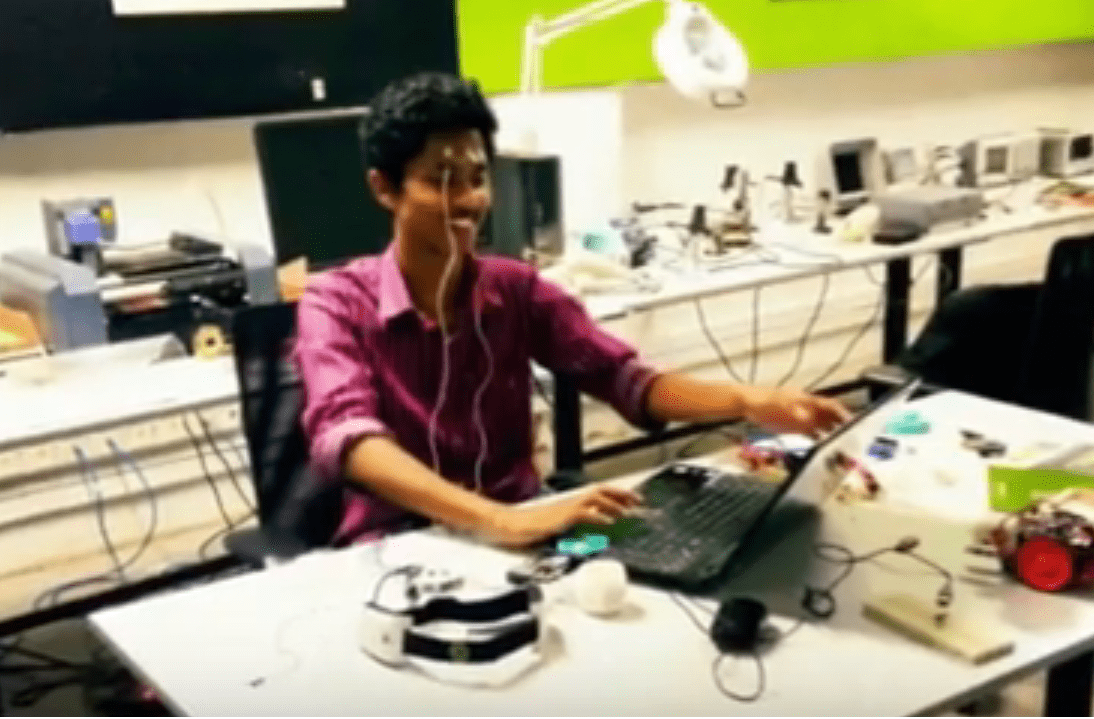Four Indian College Goers Develop NeuroBud: A Smart Device To Provide Safety To Women
With the growing economy, the malicious intent is getting a grip over human psychology. As a result, the crime rate against women has sharply inclined as per the eye-grabbing report from the National Crime Records Bureau. While strict punishments and other methods of prevention already exist in the scene, it has not been proven effective. Just why, an Indian engineering student group comprising George Mathew, Nitin Vasanth, Athul B Raj and Fausya Amalh, has made NeuroBud, a smart EEG device that connects an android application with your brain.
A third party source has reported that their work was motivated by a similar case, where their common friend did not get the time to tap her smartphone for an emergency. In such situation, an application can only be useful if it could act autonomously. With the motto, the team could come up with the prototype within one year.

Inside The Lab
The wearable named NeuroBud can detect brain waves and having any specific pattern to the corresponding match of a panic situation, it can auto-generate a SOS signal with live GPS data broadcast. The coherent study and analysis of such patterns basically trap the change in EEG impulses which directly push the system to establish a connection with the android application made by these students. No manual action is required to power the process and this is where it grows beyond the convention.
Internally, the system is equipped with 4 carbon nanotubes based electrodes which test the data and sends them to the application. Further, the built-in algorithm processes the data to capture any change. Once detected, it allows the user to dismiss the alert in the first 10 seconds. If not, the alert is simply passed on to a server. Raj, one of the members responded, it was made that way to reduce the error.
According to the video uploader Mathew, the primary craftsmanship was done at the Centre for Neurosciences at the Indian Institute of Science. They got the support to 3D print hardware, couple the carbon nanotubes with the instrument and use rapid prototyping boards. Among the group members Mathew graduated as a computer science engineer from the Atria Institute of Technology whereas Vasanth , Raj and Amalh hail from the Cochin University of Science and Technology and Model Engineering College respectively.
According to the team, the testing phase was nothing less than a challenge. Emulating a panic situation was harder than anticipated. However testing it with a lot of people reduced the chance of detecting a false positive. Having made for the society, the project had won 'innovation to empower women' award at the fifth season of Accenture Innovation Jockeys.
Watch NeuroBuds Intro video:
Source: <a href="https://github.com/neuroBuds" target="_blank" rel="nofollow noopener noreferrer">neuroBuds · GitHub</a>
A third party source has reported that their work was motivated by a similar case, where their common friend did not get the time to tap her smartphone for an emergency. In such situation, an application can only be useful if it could act autonomously. With the motto, the team could come up with the prototype within one year.

Inside The Lab
The wearable named NeuroBud can detect brain waves and having any specific pattern to the corresponding match of a panic situation, it can auto-generate a SOS signal with live GPS data broadcast. The coherent study and analysis of such patterns basically trap the change in EEG impulses which directly push the system to establish a connection with the android application made by these students. No manual action is required to power the process and this is where it grows beyond the convention.
Internally, the system is equipped with 4 carbon nanotubes based electrodes which test the data and sends them to the application. Further, the built-in algorithm processes the data to capture any change. Once detected, it allows the user to dismiss the alert in the first 10 seconds. If not, the alert is simply passed on to a server. Raj, one of the members responded, it was made that way to reduce the error.
According to the video uploader Mathew, the primary craftsmanship was done at the Centre for Neurosciences at the Indian Institute of Science. They got the support to 3D print hardware, couple the carbon nanotubes with the instrument and use rapid prototyping boards. Among the group members Mathew graduated as a computer science engineer from the Atria Institute of Technology whereas Vasanth , Raj and Amalh hail from the Cochin University of Science and Technology and Model Engineering College respectively.
According to the team, the testing phase was nothing less than a challenge. Emulating a panic situation was harder than anticipated. However testing it with a lot of people reduced the chance of detecting a false positive. Having made for the society, the project had won 'innovation to empower women' award at the fifth season of Accenture Innovation Jockeys.
Watch NeuroBuds Intro video:
Source: <a href="https://github.com/neuroBuds" target="_blank" rel="nofollow noopener noreferrer">neuroBuds · GitHub</a>
0
